This article is a resource for you to review some Cognitive Behavioral Therapy worksheets.
Ideally, you can read this article and start your own “Do It Yourself” type of therapy at home.
In this article we have a variety of CBT worksheets and you can even try some exercises out for yourself!
Please note: this article assumes you know about Cognitive Behavioral Therapy (CBT). But if you want an introduction to CBT then read my other article here.
I want to give particular credit to Hertfordshire Partnership University. They have a great CBT workbook for the public!
I’d also like to thank Positivity Psychology for making available their CBT worksheets.
But before we dive into the Cognitive Behavioral Therapy worksheets, let’s talk about whether you can actually ‘do’ CBT by yourself.
Can I Do Cognitive Behavioral Therapy On My Own?

Let’s first talk about doing CBT on your own.
You can essentially “do” CBT on your own for one simple reason:
Anyone can write down a ‘thought record’.
A ‘thought record’ isn’t anything special. It’s a journal, app or piece of paper where you can record your thoughts, feelings and situations!
- Anxiety? You can keep a thought record before situations where you feel anxiety, like a party or public speech. By writing out ‘anxiety’ situations, over time you won’t feel as much anxiety.
- Struggle with eating? Try to keep a thought record of your thoughts and feelings before you eat. By writing out ‘I’m about to binge’ you’ll become less likely to binge.
- Depressed? By writing your thoughts out on paper, you can decrease your tendency to ruminate on the negative.
DIY CBT is possible because the very act of writing and keeping a thought record helps you to deal with these types of thoughts and feelings!
You don’t need a therapist to keep a journal! If you are struggling with food try one of these food journal apps!
Indeed, what I love most about CBT is how easy it is for you to try CBT on your own. It’s a great self-help method!
By trying CBT on your own, you can see some benefits. This will motivate you to study CBT in more depth or work with a CBT therapist.
Here are two studies which looked at something called Guided Self-Help CBT:
- Guided Self-Help Cognitive Behavioural Therapy for Depression
- Pure Self-Help, Cognitive Behavioral Intervention for Depressive Symptoms
There haven’t been many studies on DIY CBT. But these studies for depression show promise for the potential of doing CBT on your own!
However, Doing CBT By Yourself Can Be Inadequate, Too.
For CBT to have long-lasting effects, you need to explore thoughts, feelings and beliefs.
But subconscious beliefs are hiding! They are underneath your conscious mind!
By yourself, it can be difficult to access your beliefs because they are your beliefs!
It’s part of human nature. We can spot out the fallacies, lies and half-truths of other peoples’ beliefs …
But we are almost blind when it comes to spotting our own core beliefs or faulty cognitive thoughts.
If you think your progress in DIY CBT isn’t progressing fast enough, then please do contact a CBT therapist.
Ok, ready dive into some Cognitive Behavioral Therapy worksheets?
What Are Some Cognitive Behavioral Therapy Worksheets?
ABC Worksheet
To understand this first worksheet, let’s examine a fundamental premise of CBT.
Your thoughts impact your body and then your body impacts how you behave. How you behave in turn impacts your thoughts.
Here’s an example followed by a blank template for you to try:
This person is having a panic attack because they are afraid of going out to the mall.
Can you see how their thoughts, behaviors and feelings all mix together?
This first Cognitive Behavioral Therapy worksheet involves becoming aware of a difficult situation or habitual behavior.
The directions are pretty simple. Fill out the bubbles according to this difficult situation or habitual behavior!
Thought Record CBT Worksheets
The ABC worksheet was an introductory awareness exercise.
This “Thought Record” worksheet from LivingCBT will help you deepen your awareness.
In the first worksheet you start by keeping a ‘thought record’, which is important in the therapy CBT approach!
You can think of this Thought Record worksheet as a tool to further explore your thoughts. It can help you understand what’s going on with your thoughts in specific situations!
The first few columns of this diary template are similar to the bubbles in the ABC worksheet. You keep a thought record, noting situations and your your cognitive thoughts, and feelings.
After you fill in the first three columns (Situation, Thoughts, Feelings) and gain some initial awareness, then you can move on to brainstorm Alternative Thoughts.
For example, sometimes you may think to yourself, ‘I had some carbs for breakfast, so I better skip lunch’.
You may have not even noticed this thought before!
But now that you/ve written this down and can literally ‘see’ this cognitive thought, what’s an alternative thought?
You can write down your Alternative Thought in the column. For example, ‘I had some carbs for breakfast, and this doesn’t matter that much. I’m going to have lunch because my body needs fuel, and if I go too long without eating then I will binge.’
The last column is where you reflect on how this Alternative Thought makes you feel.
Most people report a sense of relief as they create new perspectives for themselves!
The initial thought you wrote down may have been making you feel some anxiety.
The new alternative thought will lead to less negative anxiety feelings and give you more resources to cope!
Our cognitive mindset plays a significant role in what you feel!
Again, this is a fundamental principle of CBT therapy in the first place!
Get Unstuck From Coping Worksheet
But has the idea of self-care ever made you feel stuck?
Let’s say you use the ABC worksheet to start journaling about your depression.
Then you identify an unhelpful thought in your thought diary, for example:
‘If I am not productive every single moment of the day then I will let down other people.’
But then you come up with an Alternative Thought:
Instead of pushing myself to work 24/7, why don’t I take a 15-minute break and go for a walk?
This new cognitive thought makes you feel good. Yet when the time comes for you to take a 15-minute walk, you find yourself stuck!
If you feel stuck or resistant to new coping strategies, check out this worksheet :
This Cognitive Behavioral Therapy worksheet can help you test the consequences of your current coping strategy.
For example, your coping strategy in this example is to work through exhaustion. You keep working no matter how you feel!
The pros of this are simple. You get more work done!
But the cons of this approach can be devastating in the long term. All the stress will keep your body in a constant state of tension and you’ll be more likely to have a heart attack sooner or later.
Oftentimes humans we don’t think about the cons of our actions. So going through this CBT worksheet can help you see your actions in a new light.
Of course, you can also test your new coping strategy using this framework too.
For example, you can think about going on a walk. What are the pros? You’ll get your exercise for the day, have fun, and come back to work feeling a bit more refreshed.
The cons? 15 minutes of ‘wasted’ time?
The trade off is worth it! And it’s not a waste of time to help yourself!
Fact Check Your Beliefs Worksheet!
Of course, sometimes analyzing your thoughts doesn’t help you either.
You logically know the pros and cons of your behaviors, but you don’t feel like stopping.
In these cases, oftentimes there is a hidden belief in your subconscious mind that you believe to be true. But this belief isn’t really true!
This fact checking worksheet can help you see whether your beliefs are actual facts or not!
Seeing a supposed ‘fact’ and realizing that it is an ‘opinion’ can be very enlightening!
But again, remember this type of fact checking only works if you are keeping a thought record.
A thought record is invaluable to doing therapy CBT style!
Restructuring: Cognitive Behavioral Therapy Worksheet
Restructuring is an exercise where you deeply question your subconscious beliefs.
By questioning your beliefs you can replace these beliefs with more accurate core beliefs.
It’s important to dig into your beliefs because your beliefs are like your moral compass.
Of course, beliefs are difficult to work with. We humans get so stuck on our beliefs!
For example, there’s evidence showing people feel threatened when their political beliefs undergo questioning.
Here’s a study showing how humans perceive inconvenient political truths as attacks!
Dr. Kaplan took 40 people who identified as liberals with deep convictions.
He then put them in an MRI machine where he could see the regions of their brain.
Once participants were in the MRI machine, Dr. Kaplan started challenging their beliefs.
The participants’ brains became more activated once their beliefs started being questioned!
Because beliefs can be difficult to change, there are different ways to approach restructuring them.
Down below I’ll provide 4 steps, but please know you can find more information with this worksheet here.
What Are The 4 Steps Of Cognitive Restructuring?
As you can see, the 4 basic steps are very like what we’ve been talking about!
- Identify your thought
- List facts supporting the thought
- List facts against the thought
- Come to a conclusion
In Cognitive Restructuring you go ‘deeper’ and do more exploration about cognition itself.
More exploration is needed because sometimes listing facts can be short-sighted and miss other useful perspectives.
You can see in the image below some different ways you can challenge your thoughts!
Therapy CBT Worksheet Conclusion
I hope you try some of these worksheets out for yourself!
Let me know in the comment section below how it goes! What worksheet (or worksheets) is your favorite?



